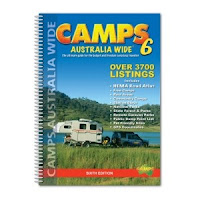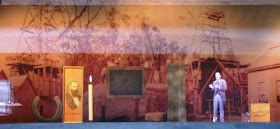Australia has free camping in many places. Sure, free accommodation might help offset other costs such as fuel and food.
 |
| Free Camping at Macrossan |
Great benefits but at a price
Cost saving is great, however there are other benefits too. We have only recently been ‘introduced’ to free camping, initially because there were such huge distances to cover in WA that we absolutely needed to pull over and have a rest between destination points.
Drop your expectations

Conditions can vary greatly and you must drop your expectations. It is not as though you can complain to the management that your site is not level or that there is gravel underneath instead of a concrete pad. Even such things as a clean toilet is not guaranteed and showers if available might only be offered from cold creek water. These sort of reasons partially explain why free camping is not for everyone.
Free camping rarely exists in towns and cities. Even some areas don’t have much available. There is pressure in many high tourist areas to close free camps. However some are in wonderful areas scattered all around Australia. Free camps offer people to stretch their holiday budget whether it allows them to stay longer, offset fuel expenses or splurge on tourist attractions they may otherwise not be able to afford.
How do I find the free camps?
So, you might ask yourself just how do I go about adding some free camping to my agenda? How can I plan for stopping at places nearby to where I want to go? Well there are free camp guides available. Most states offer you free travel maps of their state.

Some will have the rest areas listed often with facilities available listed on the map. Queensland’s Dept of Transport and Main Roads offers one called “Guide to Queensland Roads” It is freely available at any of the registered tourist information centres scattered in just about every town.
Personally we use an excellent guide called Camps Australia Wide. (Current version is 6 which came out in early 2012 ). We also bought the application to upload it directly onto our GPS. By the way, not every camp listed in the book is free, there are some listed that they consider budget sites where a small fee is charged.
Though it is considered expensive (about $60 -80) , it pays for itself with just 2 or 3 nights free camping.
What should you expect at a free camp?
A guide book helps you plan and you’ll know beforehand, what facilities are available and if you feel it will be suitable for your camping style, ability and interests. Take note that many have limited hours, often between 1-3 days with some available for longer stays. Some areas are rest areas only for day time use – no overnight camping allowed. Campers causing problems by ignoring limits and other rules sometimes are the cause of free sites being closed, so it pays to be respectful.
Toilets: As mentioned above the facilities vary and you will need to take this into consideration. Some won’t even have a toilet, so unless you have a toilet with you, you’ll need a shovel and your own toilet paper to do your business. (It is a very good idea to always approach each toilet with your own toilet paper and many run out (or have them stolen) and you certainly don’t want to be caught without when you need it.
 |
| Here lies the grave of the last person caught stealing toilet paper |
Sleeping: You also need to consider your sleeping accommodation. It could be a tent, camper trailer, caravan, 5th wheeler, motorhome and anything in between.
Washing: What about personal cleanliness? In our experience the vast majority of free camps do not offer shower facilities and if you are lucky then it will most likely be a cold shower. Sometimes you’ll strike it lucky but you might be charged for a hot shower. So you will need to have anything from a bucket wash, solar shower bag or have a shower inside your vehicle of choice.
Water supply: Don’t forget you can’t depend on even a clean water source either at each free campsite. It’s always wise to carry your own water especially drinking water.
Cooking & cooking fires: Australia is the driest continent in the world and as such there are frequent fire bans so relying on a fire for cooking or warmth may be out of the question at times. Also if are visiting a state or national area you are not allowed to collect firewood and will need to bring your own. Having a gas cook top on standby is a great idea. The butane gas type are cheap and very portable.
Rubbish disposal: Mostly there are no rubbish collection services at many free camp sites mainly due remote areas being more expensive to service or a very limited service which is quickly over full before the next service. Be respectful and take your rubbish with you, it is not as though you are paying for the service. It is easy to take it with you and deposit it in the next town you come across on your journey. Excess rubbish being left around campsites has prompted the closure of many sites around Australia.
Mobile reception & safety: There may be little or no phone or Internet reception at your campsite. Make sure that someone knows roughly where you are likely to be and what the duration and direction you are likely to take. If you truly have no friends or family, then let the local police know, just in case. Australia is not a violent country but things can happen anywhere from car breakdowns, sudden floods and fire outbreaks etc. Someone needs to know to be concerned if you don’t turn up somewhere.
Know yourself: The key is understanding your own requirements and expectations and then finding the best fit from what is available in your chosen route.
Conclusion:
Free campsites are a wonderful privilege and one that we want to keep going. Sadly the stresses, misuse or abuse of available facilities have caused many closures in recent years. We ask that you do not abuse the available services. Be respectful of the surroundings and other campers, stay tidy and clean and leave your campsite as you found it or even better, make the place a tad better than you found it.
Additional hints:
- Always arrive in daylight as it is much easier to assess your site options in the daytime.
- Stop by mid afternoon if you like the security of other campers. I find that once someone stops, then others generally will too. However if you haven’t any company by about 5pm then you usually still have enough light to get to the next place which will most likely have some campers there for safety in numbers.
- If a donation is requested then please make such in the honesty boxes provided or cheap campgrounds will close.
- Some free camps are nothing more than a strip of bitumen or even bare dirt adjacent to the highway. This might be disappointing if you expected more facilities.
- Consider arriving early as some have such great facilities or are in the best locations and may have the sites all taken up by 10am. It also pays to stop and ask if anyone was planning on leaving as there are a few people like my hubby who insist that his holiday includes a decent sleep in and frequently don’t leave until 10 or 11 am.
- The rubbish and or toilet facilities in some areas are disgusting. Certainly don’t add to it. Maybe you could do your bit and clean up a little after other inconsiderate people and take it to the next town!






















































